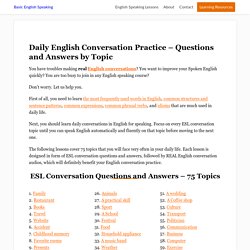

Storytelling Training Exercises & Resources. Questions and Answers By Topics - Basic English Speaking. Download Full Lessons Package – Daily English Conversation by Topic (mp3+pdf) Listening is THE KEY to better English speaking.

The more REAL English conversations you listen to, the more fluent you will become, to be sure. For a small one-time investment, you can get the whole package of 75 lessons. Put it into your phone or MP3 Player and take your English learning ANYWHERE. You can learn English on the bus while going to work. Remember, DEEP LEARNING is the No. 1 secret to English fluency. The Home of Big Questions. Communicative Worksheets.
English tongue twisters for kids. Learn a language online. Verbling - The Modern Way to Learn a Language. Formal, Semi-Formal, and Informal English. Download the text as a PDF.

Body Language Experts Compare Harry And Meghan's Relationship With Will and Kate's. Compared to Harry's buttoned-up brother and the very serious Kate, the younger prince and his fiance seem totally relaxed during their first interview together.

The first thing you'll notice is they're sitting much closer together on the couch, a sign they feel comfortable with one another, and they're also holding hands for almost the entire interview. That's not just a sign of closeness, it's also a way of reassuring your partner during a stressful time - like a royal engagement and the media circus surrounding it. Both Harry and Meghan look lovingly at each other throughout the interview, but Meghan gives lots of long, steady eye contact to the prince.
"Clearly, they're not hiding anything from each other, or trying to hide emotions from us," body language expert Traci Brown told Good Housekeeping. For most of the interview the couple laugh and joke, but things get serious at two different points. If that's not love, then what is? Share this story if you're excited for the royal wedding! Jazz chants. 7 Tips for a Perfect Elevator Pitch. What is the purpose of an interview?

Companies conduct them because they want to know about your experience, education, and character. Different interviewers ask different questions, but their underlying query is the same: Who are you? To answer that question effectively and sell your skills, you can use a special tool called an elevator pitch or elevator speech. You are about to learn what a good and bad elevator speech looks like, and how you can write an outstanding one. What Is An Elevator Pitch? EFL CLASSROOM 2.0. KARAOKE DIALOGUES - Great Practice! Karaoke Dialogues Get the dialogue ebook, videos and PPT More dialogue/conversation resources and ideas here!

Student Practice with "Blank" Dialogues Download this as a Powerpoint with the audio. > here Share. Ddeubel's Discussions. 10 Fresh Roleplay Ideas for General English. Grimace. Practical discovery of English pronunciation. Fun Tour of American Accents. One Woman, 17 British Accents - Anglophenia Ep 5. 21 Accents.
Uk.businessinsider. Formal and informal emails and letters useful links. How To Teach Formal And Informal Language. Practical ideas for teaching polite language and friendly language.

Although getting formality really right is a sign of a truly advanced learner (and is also the last thing native speaker teenagers pick up), even beginners can gain from being told the formality differences between “Can you…?” /“Could you…?” , “Good morning”/“Hello”/“Hi”, etc – and even more so nowadays when students with limited English often already have to use it in their work and travels. Even though people speaking to them will probably understand that it is a lack of knowledge that is making them say “Please give me a coffee” to the secretary, that is unlikely to completely take away the offence.
There is also the less commonly considered danger of sounding unfriendly by being too formal, e.g. continuing to address people “Dear Mr Smith” long after the replies from overseas have switched to “Dear Yuji”. 4 ESL Intonation Exercises to Practice Today. [Download This Guide] Text Version: Learning English isn’t just about memorizing definitions and stringing words together correctly in a sentence.

If you want to be understood and clearly convey what you’re feeling, it’s vital that you pay attention to your tone and word stresses. How do you do this? Think differently – communicate effectively. 1.

Opinion Continuum To introduce this activity, tell the children you’ll say a statement (such as the ones listed below). Designate one corner of the room for “strongly agree,” the opposite corner for “strongly disagree,” and the middle for “not sure.” Ask students to go to the appropriate place according to whether they agree with the statement, disagree, or aren’t sure. Try to think of statements on which students will have a range of opinions. Once students have taken their places, ask for volunteers from each location to explain their opinion. Children shouldn’t be required to do homework.
Children should have recess in the morning and in the afternoon. Children should be allowed to have cell phones in school. Children should be limited to one hour of TV a day. Children should wear uniforms in school. ProCon.org - Pros and Cons of Controversial Issues. EAP Speaking - Language. English conversation phrases and expressions for speaking practice.